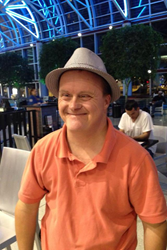LuMind Research Down Syndrome Foundation Offers 3:1 Match on Donations in Celebration of World Down Syndrome Day, March 21


Marlborough, Massachusetts (PRWEB) March 18, 2015
In honor of World Down Syndrome Day on March 21, 2015, LuMind Research Down Syndrome Foundation is matching all donations 3:1 through its website at http://www.LuMindFoundation.org/donate-wdsd. The mission of LuMind Research Down Syndrome Foundation is to accelerate research to improve learning, memory, and speech for children and adults with Down syndrome and make it possible for them to live more independent lives.
According to LuMind Research Down Syndrome Foundation, “Federal funding for Down syndrome is only approximately $ 60 per person. On average, that’s about 10-40+ times less than what the government spends on research for many other disabilities.” The goal of the foundation on World Down Syndrome Day 2015 is to increase awareness about the importance of cognition research and raise desperately needed private funds for cognition research through the matching program.
The 3:1 match begins on Wednesday, March 18, 2015 initiating a 3-2-1 countdown to World Down Syndrome Day on March 21. Any donations received three days leading up to World Down Syndrome Day as well as donations on March 21 will qualify for the 3:1 match. LuMind Research Down Syndrome Foundation also has several additional activities planned to celebrate World Down Syndrome Day.
“For the fourth year running, we’re maximizing the impact of our supporters’ contributions,” said Ryan Hartman, chair of LuMind Research Down Syndrome Foundation’s board and parent of a child with Down syndrome. “Support from individuals is essential to fueling research discoveries. Our World Down Syndrome Day matching program gives people a strong incentive to show their commitment to the urgent work we fund. We thank all our friends and supporters for their confidence in this research, and for their investment in a future of greater opportunity and independence for people with Ds.”
An especially exciting aspect of Down syndrome cognition research is investigations unraveling the complicated and tangled connections to Alzheimer’s disease. People with Down syndrome share a similar brain neuropathology with Alzheimer’s disease patients, and both communities seek measures to improve and retain cognitive abilities, such as speech, memory, and learning.
“Given the remarkable similarities to the brains of people with Alzheimer’s disease and earlier in the lives of those with Down syndrome, cognition research to help people with Ds may also help the more than 5 million Americans currently affected by AD and could hold a unique key to delaying or preventing Alzheimer’s in everyone,” said Dr. Michael Harpold, the organization’s Chief Scientific Officer. “Researchers have made great strides towards identifying the mechanisms associated with intellectual disability in people with Ds, understanding the links between Down syndrome and Alzheimer’s disease, and finding and pursuing promising pathways for treatment.”
Visit http://www.LuMindFoundation.org to learn more about the research they fund and to donate for World Down Syndrome Day.
About the LuMind Research Down Syndrome Foundation
LuMind Research Down Syndrome Foundation, formerly the Down Syndrome Research and Treatment Foundation (DSRTF) and Research Down Syndrome (RDS), is an international non-profit organization headquartered in Marlborough, Massachusetts, aimed at accelerating the development of treatments to significantly improve cognition, including memory, learning and speech, for individuals with Down syndrome. LuMind Research Down Syndrome Foundation is the leading source of private funding supporting Ds cognition research at major research centers, including Johns Hopkins Medicine, Stanford University, University of California, San Diego, and University of Arizona. Over the past decade, LuMind Research Down Syndrome Foundation has committed almost $ 12 million to fund results-driven research programs that will benefit children and adults with Down syndrome and has been instrumental in the initiation of four clinical trials now under way.